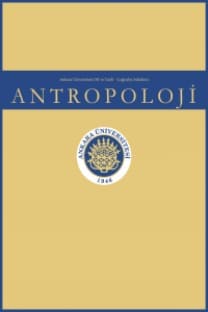Ahlâkî dünyaların inşasında kültürel değerler: Ahlâk antropolojisi üzerine güncel tartışmalar ve eleştiriler
Cultural values in constructing moral worlds: Current debates and critiques on moral anthropology
Cultural anthropology, moral anthropology cultural values,
___
- Caduff, C. (2011). Anthropology’s ethics. Moral positionalism, cultural relativism, and critical analysis. Anthropological Theory, 11(4), 465-480. https://doi.org/10.1177%2F1463499611428921
- Das, V. (2010). Engaging the life of the other: Love and everyday life. In M. Lambek (ed.), Ordinary ethics: Anthropology, language, and action (pp. 376-399). Fordham University Press.
- Fader, A. (2009). Mitzvah girls: Bringing up the next generation of hasidic Jews in Brooklyn. Princeton University Press. https://doi.org/10.1515/9781400830992
- Heim, M., and Monius, A. (2014). Focus on recent work in moral anthropology. Journal of Religious Ethics, 42(3), 385-392. https://doi.org/10.1111/jore.12062
- Holbraad, M. (2018). Steps away from moralism. In B. Kapferer and M. Gold (eds.), Moral anthropology: A critique (pp. 27-48). Berghahn Books. https://doi.org/10.2307/j.ctvw04hdc.4
- Fassin, D. (2008). Beyond good and evil?: Questioning the anthropological discomfort with morals. Anthropological Theory, 8(4). 333–344. https://doi.org/10.1177/1463499608096642
- Fassin, D. (2012). Introduction: Toward a critical moral anthropology. in D. Fassin (ed.), A companion to moral anthropology (pp. 1-19). John Wiley & Sons, Inc. https://doi.org/10.1002/9781118290620.ch
- Kapferer, B., and Gold, M. (eds). (2018). Moral anthropology. A critique. Berghahn Books. https://doi.org/10.2307/j.ctvw04hdc
- Kluckhohn, C. (1962). Values and value-orientations in the theory of action: An exploration in definition and classification. In T. Parsons and E. A. Shils (eds.), Toward a general theory of action: Theoretical foundations for the social sciences (pp. 388-433). Harper & Row. (Original work published in 1951).
- Laidlaw, J. (2002). For an anthropology of ethics and freedom. Journal of the Royal Anthropological Institute, 8(2), 311-332. https://doi.org/10.1111/1467-9655.00110
- Lambek, M. (2010). Introduction. In M. Lambek (ed.), Ordinary ethics: Anthropology, language, and action (pp. 1-36). Fordham University Press.
- Lambek, M. (2010). Toward an Ethic of the Act. In M. Lambek (ed.), Ordinary ethics: Anthropology, language, and action (pp. 39-63). Fordham University Press.
- Robbins, J. (2004). Becoming sinners: Christianity and moral torment in a Papua New Guinea society. University of California Press. https://doi.org/10.1525/9780520937086
- Robbins, J. (2007). Between reproduction and freedom: Morality, value, and radical cultural change. Ethnos, 72(3), 293-314. https://doi.org/10.1080/00141840701576919
- Robbins, J. (2012). Cultural values. In D. Fassin (ed.), A companion to moral anthropology (pp. 115-132). John Wiley & Sons, Inc. https://doi.org/10.1002/9781118290620.ch7
- Robbins, J. (2013). Beyond the suffering subject: Toward an anthropology of the good. Journal of the Royal Anthropological Institute. 19(3), 447-462. https://doi.org/10.1111/1467-9655.12044
- Zigon, J. (2007). Moral breakdown and the ethical demand: A theoretical framework for an anthropology of moralities. Anthropological Theory, 7(2), 131-150. https://doi.org/10.1177%2F1463499607077295
- Zigon, J. (2014). An ethics of dwelling and a politics of world-building: A critical response to ordinary ethics. Journal of the Royal Anthropological Institute, 20(4), 746-764. https://doi.org/10.1111/1467-9655.12133
- Zigon, J., and Throop, C. J. (2014). Moral experience: Introduction. Ethos, 42(1), 1-15. https://doi.org/10.1111/etho.12035
- ISSN: 0378-2891
- Yayın Aralığı: 2
- Başlangıç: 1963
- Yayıncı: Ankara Üniversitesi Basımevi
Türkiye’de koruma siyaseti ve yerel topluluklar: Köprülü Kanyon Millî Parkı örneği
Cemaat izinde bir görme biçimi arayışı: “İhsan Hala” belgeseli
Genç erişkin bireylerde vücutta altın oran değerlendirmesi
Yasemin AKI ABACI, Ayla KÜRKÇÜOĞLU, Tuğçe ŞENÇELİKEL
Sebile ONUR, Seda KARAÖZ ARIHAN
Parçalı tibia uzunluğunun proksimal ve distal ölçümlerle hesaplanması
Serdar BABACAN, İ̇lker Mustafa KAFA
Balıkçılığın eski Anadolu toplumlarındaki yeri
